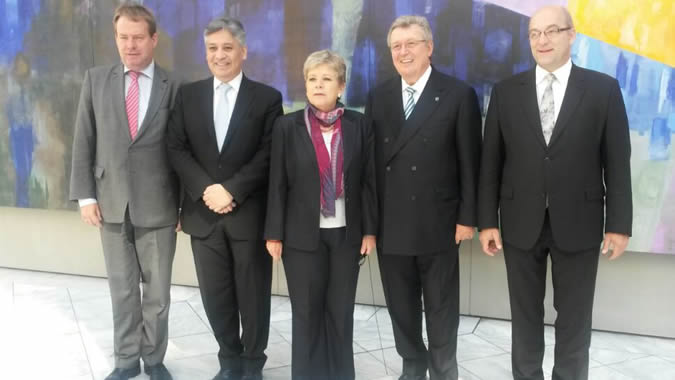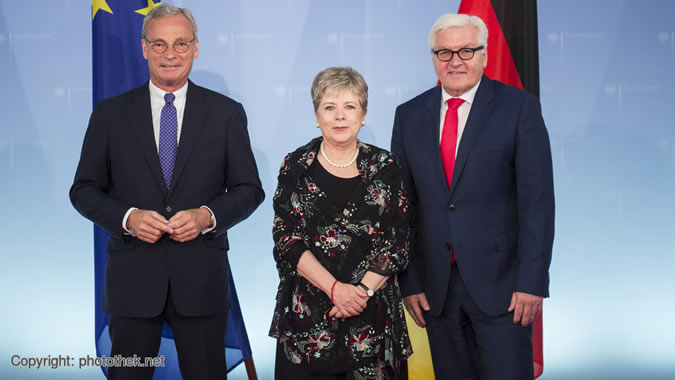On Visit to Germany, Alicia Bárcena Calls For Taking Advantage of Investment Opportunities in Latin America and the Caribbean
Work area(s)
ECLAC’s Executive Secretary launched an initiative for an export platform in the region during meetings with businesspeople and government authorities in Berlin.

The Executive Secretary of the Economic Commission for Latin America and the Caribbean (ECLAC), Alicia Bárcena, called for taking advantage of the opportunities and advantages that the region offers to foreign investors and launched a cooperation initiative with German businesspeople to create a Latin American export platform, during meetings held in Berlin.
In a two-day visit to the German capital, Bárcena met with German executives with Latin American business interests during the commemoration of the 100th anniversary of Lateinamerika Verein (the Business Association for Latin America) and was the main speaker at the Colloquium on “The Future of Latin America: Risks and Opportunities for German companies,” which was organized by the Latin America Initiative of German Business (Lateinamerika-Initiative der Deutschen Wirtschaft, LAI) and the Group of Ambassadors from Latin America and the Caribbean (GRULAC).
The senior United Nations officials also met with German Foreign Affairs Minister Frank-Walter Steinmeier and authorities from the Federal Ministry for Economic Cooperation and Development (BMZ).
In her speech before Lateinamerika Verein, Alicia Bárcena stressed that the relationship between Germany and Latin America and the Caribbean historically has been very dynamic and collaborative. She added that what is needed today is to kick-start the drivers of growth, productivity and technological dissemination, while also making a big environmental push. To achieve this, the strategic alliance with Germany and with business associations fundamentally must be reinforced, she said.
“The business communities of Germany and Latin America are indispensable for regional development. In our region we fondly await you,” Bárcena said.
She also pointed to the importance of successfully concluding an agreement between MERCOSUR and the European Union, since this would strengthen mutual trust and enable the region’s corporate development.
Meanwhile, at the same event Minister Steinmeier praised the “consolidation” seen today in Latin America, in a world shaken by asymmetrical conflicts and non-conventional wars.
“Latin America is a ‘landscape of hope’ in difficult times,” said Steinmeier, highlighting the positive examples for the region as a whole of the peace process in Colombia and Cuba’s moves to open up.
At the Colloquium on “The Future of Latin America: Risks and Opportunities for German companies,” Alicia Bárcena made a presentation before business leaders and ambassadors from countries of the region in the European country. She was received by Ramón Custodio, the Ambassador of Honduras and Pro Tempore President of the GRULAC, and Reinhold Festge, President of the LAI.
It was there that ECLAC’s Executive Secretary launched a cooperation initiative with German businesspeople to create a Latin American export platform, with technology and sustainability.
German exports of goods and services have maintained a surplus towards the region and they became more competitive after the crisis, reaching their highest level in 2013 at more than $40 billion dollars. In 2015 Germany’s biggest trading partners in the region were Brazil, Mexico, Argentina, Chile and Colombia, with trade in products such as cafe, iron, soy, auto parts, electro- and electronic materials and machinery.
Germany exports to Latin America and the Caribbean capital goods, transportation equipment and industrial inputs (parts and components), while the region mainly exports industrial inputs and food products. This reflects the typical pattern of North-South trade, Bárcena indicated.
For this reason she called on businesspeople to tap into the advantages the region offers and asked that they diversify their investment portfolios, with emphasis on the technological revolution and renewable energies.
Among the advantages for investors she mentioned an expanding market of 600 million inhabitants and a growing middle class, new initiatives aimed at trade and productive integration (such as advances in the Pacific Alliance and its moves to draw closer to MERCOSUR), the presence of democracy and low degrees of social tension, legal certainty, stability in rules regarding taxation and investment, and an attitude that favors quality Foreign Direct Investment (FDI), based on technology, employment and sustainability.
“Our region also has a commitment to make a big environmental push, that is why it is important to take advantage of investment opportunities in sectors with a high technological component, such as renewable energies, advanced production systems that build on the German experience with Industry 4.0, and the creation of a single regional digital market,” Bárcena said.
Related content

Germany and ECLAC Reaffirm Cooperation Ties for Follow-up to the 2030 Agenda in Latin America and the Caribbean
The Executive Secretary of the UN organization, Alicia Bárcena, met with the German Foreign Affairs Minister, Frank-Walter Steinmeier.

Conmemoración de los 100 años del Lateinamerika Verein
Intervención de Alicia Bárcena, Secretaria Ejecutiva de la CEPAL.

Oportunidades para fortalecer la relación económica entre Alemania y América Latina
Presentación de Alicia Bárcena, Secretaria Ejecutiva de la CEPAL, en el Coloquio "El futuro de América Latina: riesgos y oportunidades para empresas alemanas".
Subregional headquarter(s) and office(s)
Country(ies)
Related project(s)
Contact
Public Information Unit
- prensa@cepal.org
- (56 2) 2210 2040
